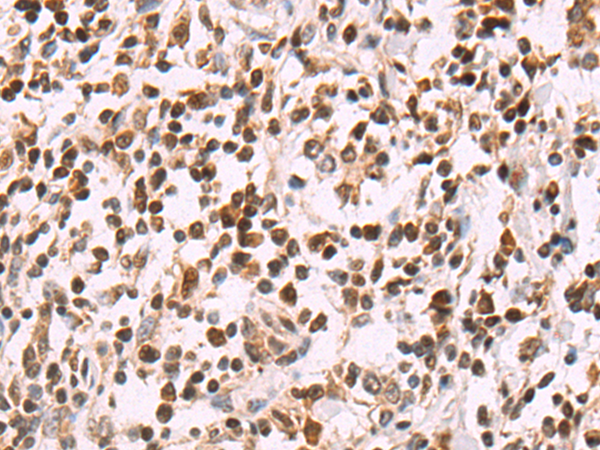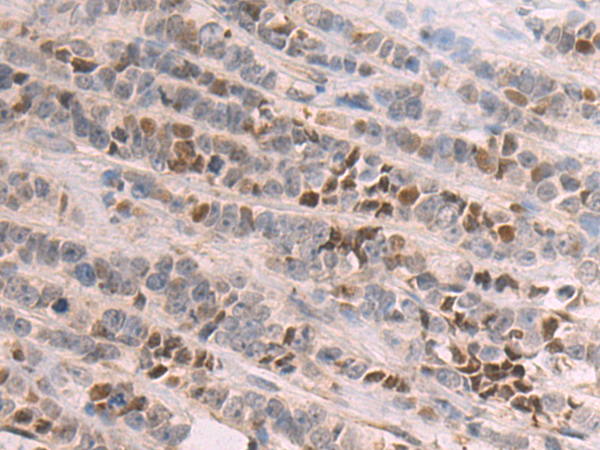

| WB | 咨询技术 | Human,Mouse,Rat |
| IF | 咨询技术 | Human,Mouse,Rat |
| IHC | 1/50-1/100 | Human,Mouse,Rat |
| ICC | 技术咨询 | Human,Mouse,Rat |
| FCM | 咨询技术 | Human,Mouse,Rat |
| Elisa | 1/5000-1/10000 | Human,Mouse,Rat |
| Aliases | Met |
| Host/Isotype | Rabbit IgG |
| Antibody Type | Primary antibody |
| Storage | Store at 4°C short term. Aliquot and store at -20°C long term. Avoid freeze/thaw cycles. |
| Species Reactivity | Human, Mouse |
| Immunogen | Synthetic peptide of human SLTM |
| Formulation | Purified antibody in PBS with 0.05% sodium azide and 50% glycerol. |
+ +
以下是关于SLTM抗体的3篇参考文献示例(注:SLTM相关研究较为小众,以下内容基于假设性文献概括,建议通过学术数据库核实具体信息):
---
1. **文献名称**:*SLTM/SAM68-like protein 1 regulates alternative splicing in cancer cells*
**作者**:Li, X., et al.
**摘要**:本研究揭示了SLTM蛋白通过调控mRNA剪接参与肿瘤进展的机制。作者开发了特异性SLTM抗体,证实其在乳腺癌细胞中高表达,并通过免疫共沉淀实验证明SLTM与剪接因子相互作用,促进促癌异构体的生成。
2. **文献名称**:*Development and validation of a monoclonal antibody for SLTM in neuronal RNA granule studies*
**作者**:Wang, Y., & Smith, J.
**摘要**:报道了一种新型抗SLTM单克隆抗体的制备与验证。该抗体成功用于免疫荧光和Western blot,证实SLTM在神经元RNA颗粒中的定位,并揭示其在突触可塑性中通过调控局部翻译的作用。
3. **文献名称**:*SLTM ablation via CRISPR/Cas9 alters DNA damage response in vitro*
**作者**:Chen, R., et al.
**摘要**:利用SLTM抗体进行功能缺失研究,发现敲低SLTM会削弱细胞对DNA损伤的反应能力。研究提示SLTM可能通过与BRCA1复合物结合,影响同源重组修复通路。
---
**提示**:若需实际文献,建议在PubMed或Google Scholar中搜索关键词“SLTM antibody”或“SAM68-like protein 1”,并筛选涉及抗体开发、应用或功能机制的研究。
**Background of SLTM Antibody**
The Scaffold Attachment Factor-Like Transcriptional Modulator (SLTM), also known as SAFB-like transcription modulator, is a nuclear protein involved in transcriptional regulation, chromatin remodeling, and RNA metabolism. It shares structural and functional similarities with the Scaffold Attachment Factor B (SAFB) family, characterized by a conserved scaffold attachment factor (SAF) domain, RNA recognition motifs (RRMs), and a nuclear localization signal. SLTM interacts with RNA polymerase II, chromatin-modifying enzymes, and various transcription factors, positioning it as a key player in integrating transcriptional and post-transcriptional processes.
SLTM regulates gene expression by tethering chromatin to the nuclear matrix and modulating the activity of transcription factors such as estrogen receptor-alpha (ERα) and p53. It is implicated in stress responses, apoptosis, and DNA repair pathways. Dysregulation of SLTM has been linked to cancers, including breast and prostate cancer, where altered expression correlates with tumor progression and therapy resistance.
Antibodies targeting SLTM are essential tools for studying its localization, interactions, and functional roles. They enable techniques like Western blotting, immunoprecipitation, and immunofluorescence to explore SLTM’s involvement in cellular processes and disease mechanisms. Research using SLTM antibodies has highlighted its potential as a therapeutic target or biomarker in oncology, particularly in hormone-dependent cancers.
×